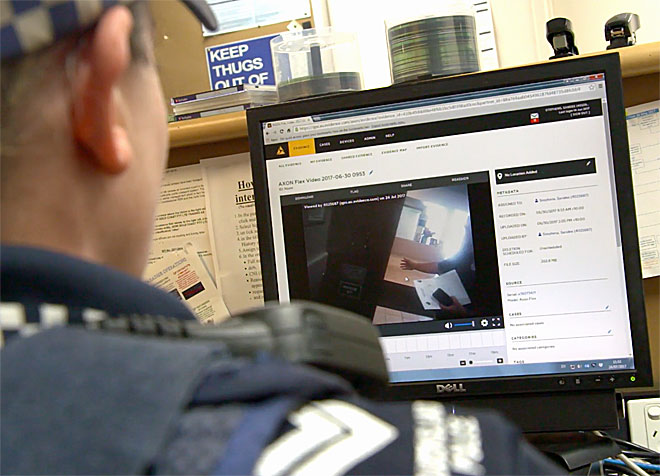A groundbreaking new case study demonstrating the effects of body worn cameras on domestic and family violence (DFV) cases, has been released by Axon.
The case study was conducted in conjunction with the Queensland Police Service (QPS) in Australia.
It showed an increase in charges filed, arrests and convictions for DFV cases following a deployment of 5,100 Axon body worn cameras by the agency.
See a video highlighting the results of the study below:
(See how Axon is helping to fight domestic violence in Australia. Courtesy of Axon and YouTube)
In light of the more than 5,000 responses to DFV cases each week by Australian law enforcement, QPS mandated that all officers document DFV situations with their body worn cameras.
 The presence of body worn cameras at the scene of the incident has proven to cause abusers to admit guilt and avoid a trial, saving time and money for police agencies.
The presence of body worn cameras at the scene of the incident has proven to cause abusers to admit guilt and avoid a trial, saving time and money for police agencies.
In cases that have gone to trial, the presence of video has led to an increase in conviction rates.
Subsequently, more victims have been encouraged to come forward and report on incidents of not only domestic violence, but assaults and life threatening acts.
Since the QPS implemented their new policy on documenting all DFV situations with their Axon body cameras in 2015, more than 50,000 videos pertaining to DFV cases have been uploaded.
The case study, conducted between July 2016 and September 1, 20 17, revealed the following results:
- A 60% to 70% decrease in police summary hearings.
- Video footage can be used in “Accelerated Evidence Trial” programs, which often resolve domestic violence cases before going to a full trial, saving time and money for the agency.
- A 22% projected increase in DFV reporting.

“The after – image of a domestic violence incident tends to be messy and chaotic – from even one frame it’s obvious that things are not normal,” says Detective Inspector Marc Hogan of the Queensland Police Service.
“Capturing that chaos on paper used to be virtually impossible, but Axon has enabled us to preserve these tragic scenes.”
“Domestic and family violence continues to be an issue across Australia, but thanks to this technology we are making real strides – both toward increasing visibility and bringing a greater number of prosecutions.”
 The Axon network is a network of devices, apps and people that helps law enforcement become smarter and safer.
The Axon network is a network of devices, apps and people that helps law enforcement become smarter and safer.
- In the field – Our Smart Weapons offer a less – lethal intermediate use of force response and our body – worn and in – car cameras collect video evidence to capture the truth of an incident; and our mobile applications enable simple evidence collection.
- At the station – Our secure, cloud – based digital evidence management solution allows officers and command staff to manage, review, share and process digital evidence using forensic, redaction, transcription, and other tools.
- In the courtroom – Our solutions for prosecutors make collaborating across jurisdictions and agencies easy so that cases can be resolved quickly.
“Seeing the Queensland Police Service success in this area has been truly inspiring,” says Axon CEO and founder, Rick Smith.

“Not only has the body – worn camera initiative enabled law enforcement to more effectively prosecute these cases, but it has given citizens the confidence and courage to increasingly come forward with their own stories.”
“Seeing QPS’s success only reinforces our vision of a future defined by more efficient policing, increased time in the field for officers, and a strengthened bond of trust between agencies and the citizens they protect.”























